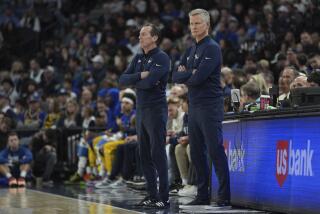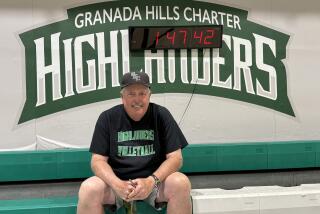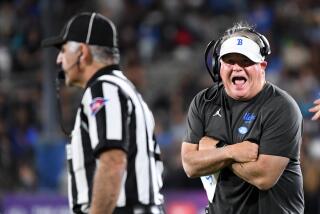Quigley Is a Helluva Coach and Some Even Swear by It
- Share via
To say that Wayne Quigley is a football coach would be like referring to a junkyard doberman as a dog or calling the great white shark that ate your cousin Mel a fish. Quigley looks like a football coach, acts like a football coach and uses, in all of its spectacular color, the language of a football coach.
Consider, for example, this incident: A visitor to Calabasas High School casually asks a football player where he might find assistant coach Quigley, and gets this response: “Up on the baseball field. And he swears a lot. Blank, blank, blank. Every other word.”
To say that Quigley cusses with every other word is an exaggeration. But it suffices to say that his on-the-field choice of words would empty a Baptist bingo hall in a big, big hurry.
This is common among football coaches at all levels. But it is part of the reason that Quigley was, in 1985, thrown out of Granada Hills.
The final weeks of Quigley’s highly successful five-year stint as Granada Hills’ head football coach were ugly. His firing involved, according to then-principal Albert Irwin, “philosophical differences.” Irwin will not elaborate, and Quigley, well, let’s just say that Quigley is not real fond of his former employer.
The firing came after two of Quigley’s players, a school custodian and several parents complained to Irwin about the coach’s behavior. He was accused--in an unsigned letter allegedly written by parents--of verbally humiliating and embarrassing one player for the entire season.
The parents should have asked Quigley about the incident. He would have signed their letter.
“I rode that kid harder than any kid I had ever coached, ever,” he said this week while Calabasas was preparing for Friday night’s playoff game against Cabrillo. “And you know why I rode him so hard? Because he was slow, short, fat and weak, but he thought he was an All-American.
“I had to keep telling him that he wasn’t an All-American.”
There goes that darn Quigley again, mincing words.
He readily admits that his coaching success has been based largely on his ability to motivate, to convince 16- and 17-year-old kids to crash into each other at top speed and that despite their girlfriends’ protests, a fat and bloody and generally unkissable lip is a small price to pay for glory on the football field.
Quigley’s basic philosophy is this: If you want to play some tackle football, fine. I’ll help you, I’ll make you better. But if you don’t want to play tackle football, go buy a chess set, ponder that dramatic pawn-to-King4 move and stay the hell off my football field.
“Wayne didn’t run practice any different than any coach I’ve ever been around,” said Bob Francola, who worked as Quigley’s assistant at Granada Hills for four years and quit when Quigley got fired. Francola is now coach at Kennedy.
“I’ve been around football for 16 years and I’ve seen it all,” he said. “Wayne never let anything get out of hand. He tried to pump a couple of kids up, tried to motivate them, and one or two of them got mad. We’re all emotional people playing an emotional game, but obviously some people felt Wayne’s behavior should cost him his job. He never got his day in court, never got to tell his side of the story, never got a fair hearing. The principal made it a one-man show. He just wanted Wayne outta there.
“There are deep wounds from that time in our lives.”
Quigley, who is 40, admits that it was a tough time in his life, but the wounds, if there are any, don’t show. He was hired at Calabasas as an assistant coach just two months after being fired. As the offensive coordinator this season, he has helped guide the Coyotes to a share of their first Frontier League championship.
“I like it here,” he said. “I don’t miss the tedious process of paperwork and busy work that occupies so much of a head coach’s time. And I don’t miss being known as a head coach. My ego is big, but it’s not that big. Everyone is so supportive here, from the fans and parents and alumni to the adminstration, just everyone. It’s so important to have them on your side.
“I’d much rather be an assistant coach at a place where everyone’s pulling together than in some place where you have to fight city hall every day.”
One of those who Quigley considered part of city hall was Darryl Stroh, who coached the B team at Granada Hills before replacing Quigley. You probably wouldn’t want to invite these two guys to the same cocktail party.
“I will have no comment on Wayne Quigley because I just don’t feel it’s necessary,” Stroh said. “I don’t even want to be brought into it at all. As far as I’m concerned, it’s over. There are a lot of deep wounds, and nothing I can say can make it better. We were never very close, and I just don’t have anything that I want to say about the man.”
Offsetting the few who have criticized Quigley are the many who think highly of him.
From former player Greg Fowble: “Coach Quigley always let you know what he was thinking, and it was sometimes very loud. But I don’t think he did it on purpose and I don’t think he ever did it to embarrass anyone. If he yelled at you, it was because you had screwed up.”
Another player who was guided by Quigley at Granada Hills was Eric Davis. “I liked his approach. He did get loud and he did yell, but that just fired you up. There’s a bunch of guys on the field playing football and the language and the yelling can get pretty intense. There’s no girls out there. A coach gets angry and a few cuss words come out. I don’t see anything wrong with that. It’s part of the game to yell and scream, but there’s always a few kids who can’t take it.”
And while there may have been some celebrating by a few people at Granada Hills when Quigley was canned in 1985, the firing also generated some excitement at Calabasas.
“I knew him from his football reputation,” said Calabasas head Coach Larry Edwards, “and when I read in the paper about him losing his job I called our people right away and said, ‘We’ve got to get this guy here.’
“He came for an interview, and I offered him the job as he came in the door. I knew he was a darn good coach. And now, I think he’s a super coach. His background and experience has definitely helped our program expand and be a success. He might be loud, but he has never been degrading or embarrassing to players. Never. He just has a loud voice. If some kids complained about that at Grenada Hills, that is not necessarily a reflection on his ability to coach and to motivate kids. Our kids love him. They like the motivation he supplies.
“Granada Hills’ loss is our gain. We’re very, very glad to have him.”
More to Read
Get our high school sports newsletter
Prep Rally is devoted to the SoCal high school sports experience, bringing you scores, stories and a behind-the-scenes look at what makes prep sports so popular.
You may occasionally receive promotional content from the Los Angeles Times.






